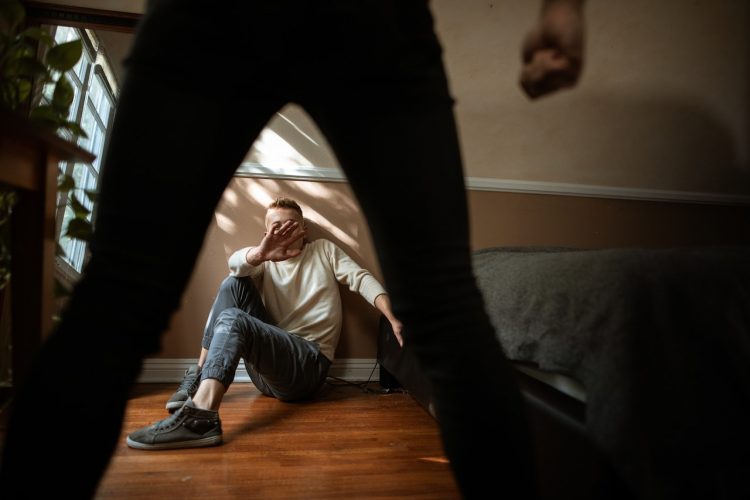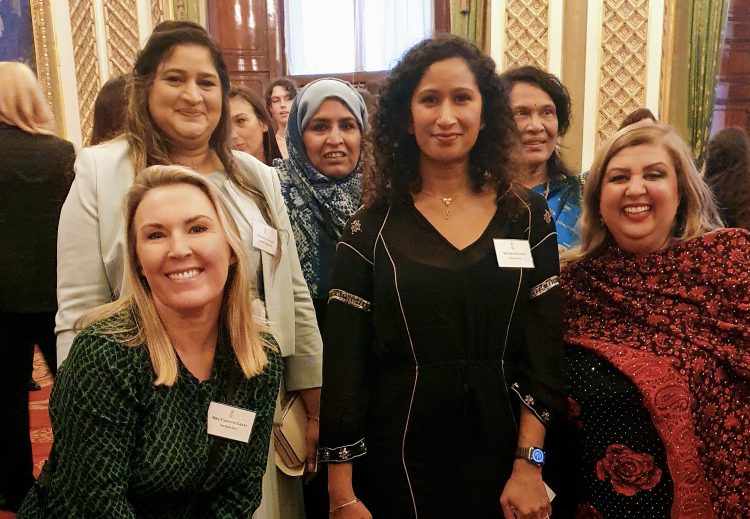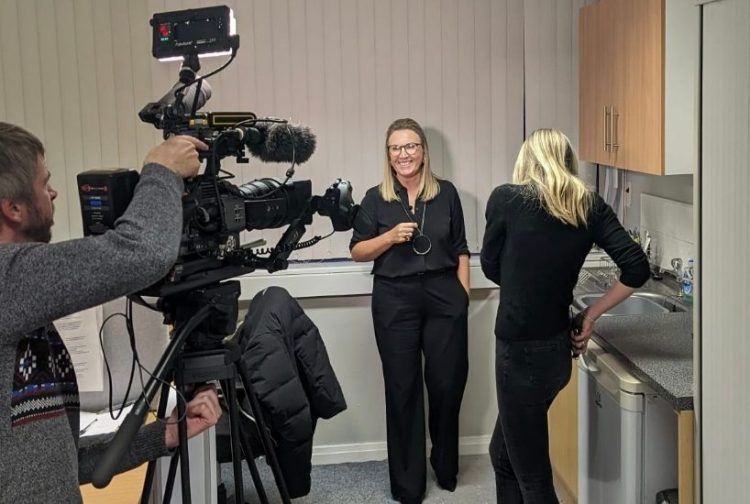Domestic abuse: the epidemic that never ends
Long read: Caroline Grant, CEO of Knowsley charity The First Step talks to LBN about working in a borough with one of the worst records for domestic abuse and homicide. Tony McDonough reports

Domestic abuse is endemic in all sections of society. It doesn’t recognise class or economic boundaries.
From the single mother on benefits to the executive on a six-figure salary, all can fall victim to coercive control, psychological torment, financial control, sexual abuse and, of course, physical violence and, too often, homicide.
“We have high-earning professionals who come to us because their financial independence has been taken away by an abusive partner,” says Caroline Grant, chief executive of Knowsley domestic abuse charity The First Step.
“Some of these women are earning £100,000-plus a year and they are having to come to us for food.”
It is easy to think of domestic abuse as a problem that exists only behind front doors with little impact beyond the survivors themselves, and maybe their children. But data shows the impact on our communities, and on the wider economy is huge.
A Home Office report published in 2019 estimated the annual cost of domestic abuse in the UK was a eye-watering £66bn. Cost of the physical and emotional harm to the victims themselves is estimated at £47bn with a further £14bn in lost productivity.
“That is another misconception,” explained Caroline. “People don’t realise how much domestic abuse impacts the wider economy. There needs to be someone really looking at this.
“There will be very few workplaces, either in the public or private sector, that aren’t impacted by domestic abuse. Working at your local supermarket there is likely to be either a survivor or a perpetrator.
“If you have been up all night on the receiving end of domestic abuse then how can you function properly at your job?
“It is not uncommon for victims to continue to be abused in the workplace. There is a huge impact across the economy and we need to be linking the two things together.”
A former police officer, Caroline has been at The First Step for six months but she has worked in the domestic abuse sector for almost 25 years, mainly in Liverpool and Manchester.
The charity, which employs 25 people, has been in existence since 1996. This was long before there was a statutory duty on local authorities to provide resources to support abuse survivors.
“Domestic abuse has been around since time began and the origins of what we do was based around what the community needed – and we have never changed that,” said Caroline.
“Everything we do is based upon that need. We have a refuge that offers emergency accommodation, and we deliver a national model of support called Independent Domestic Violence Advisory (IDVA).
“This supports victims or survivors of domestic abuse that have been assessed, primarily by the police, as being at high risk of serious harm or fatality.
“Then we deliver the community aspect which is the prevention work and the de-escalation work, which is around education and trying to ensure situations don’t escalate to high risk.
“It also deals with the recovery work if the abuse does escalate to high risk.”
Tip of the iceberg
So what is the scale of the problem? Domestic abuse is always with us, on every street and in every community. It reached new heights during the pandemic when lockdowns forced people to stay in their homes for long periods.
The Crime Survey for England and Wales showed that 1.6m women and 757,000 men had experienced domestic abuse between March 2019 and March 2020, with a 7% increase in police reports.
And the Office for National Statistics (ONS) reported that in mid-May 2020, there was a 12% increase in the number of domestic abuse cases referred to victim support. Between April and June 2020, there was a 65% increase in calls to the National Domestic Abuse Helpline.
And what is most chilling of all is that that official data may be just the tip of the iceberg. Caroline said: “The ONS estimates only 11% of domestic abuse cases are ever reported to the police. And to me that sounds about right.”
Although The First Step takes on survivors who have been referred to it by the police and other professionals, Caroline adds that 37% of its cases have never reported to the police.
“Our community-based service is self-referral only. We have 370 cases open for support from individuals who have elected to seek help, and then we have 191 people on a waiting list, that tells you how much demand there is.”
The fact that the charity even has to operate a waiting list is one that angers Caroline. The First Step currently operates on a budget of just under £1m a year but, she adds, that is “just about enough to keep the lights on – and right now it is barely doing that”.
She estimates that to run the service based on demand it would cost a a lot more. The organisation receives some year-on-year local and central government funding.
Most of this is only annual funding which means little sustainability for both staff and those in receipt of support. The bulk of its income comes from fund-raising.


Every year figures for domestic abuse homicides are collated and, when they are available, Labour MP Jess Phillips stands up in the House of Commons and reads out the names of every victim.
This year on March 9 the names were read and it was acknowledged by the team who collate the statistics that Knowsley is the worst constituency in the country for the killing of women (Counting Dead Women 2023).
An oft-quoted statistic is that, on average, two women are killed by a partner or an ex-partner in the UK every single week.
Co-ordinated approach
In the last few decades there have been a number of high profile cases that have impacted on policy. These include the sadistic torture and murder of eight-year-old Victoria Climbié at the hands of her great aunt and boyfriend in 2000.
Today we have both the IDVA and MARAC (multi-agency risk assessment conference).
They encourage multi-agency work to share information to reduce the risk of the victim/ survivor and children. The IDVA role in this is to act as the voice of the victim and to coordinate the professional response while advocating for the victim throughout.
Caroline explained: “During the Victoria Climbié case it was found lots of different agencies had information about the child but hadn’t shared it. If that had happened she may have survived.
“When domestic homicides were looked at the same principle was identified. The aim of IDVA is to create a conduit for professionals to share information and to be the voice of the victim. IDVA keeps the victim or survivor at the heart of everything.
“A survivor may be in a situation where there is police involvement, children’s social care, probation, debt, they can’t pay their rent, they may have criminality of their own, they may have trouble in work or they may be at risk of losing their job.
“IDVA will risk manage their situation right across the system and offer them choices and advocate for them. Every local authority area has a multi-agency risk-assessment conference which focuses on every single high-risk case.
“In Knowsley all of the professionals will come up with a plan to minimise the risk to the individuals and children and to deal with the perpetrator as well. It is a really really important function. Coordination is how we prevent things being missed.”
Those high-risk cases are dealt with swiftly but it is the ones that don’t meet that standard that Caroline is very concerned about.
“37% of cases we are dealing with have never reported their abuse to the police and never will for their own personal reasons. That does not mean they are not high risk.
“This is why the community-based service we operate is one of the most important aspects of what we do. It is absolutely disgusting that we have to operate a waiting list because we don’t have the resources to respond to the demand.
“We currently have 191 people on the list for specific elements of trauma-based support that they really need. What we deliver is critical but the resource is just not there.
“People will have their own reasons for not wanting to call the police. They may have called them on an earlier occasion and didn’t get a good response.
“They may be professionals. We have victims who work for the police, for the council, elected officials – who don’t want other professionals they work with people knowing about their situation. They feel ashamed.
“So the only place they choose for support is independent bodies such as ourselves.
“Then we get a lot of people who don’t go to the police because they don’t want to criminalise the person they love who is responsible for the abuse. It can be the father of their children and it can even be their own adult child who is the perpetrator.
“There are a million and one reasons why they won’t go to the police.”
‘Survivors are not being listened to’
Caroline acknowledges there has been progress. The Domestic Abuse Act 2021 has put a legal duty on Government bodies to respond to domestic abuse in specific ways. Things such as access to refuges and therapeutic support.
She said: “This has been very welcome for a number of reasons. Believe it or not strangulation – putting your hands around someone’s neck until they pass out was classed as one of the lowest levels of assault.
“That is now changed to ‘non-fatal strangulation’ which is a more significant offence.
However, there is also frustration from Caroline around the misconceptions about domestic violence. Too often, she explains, the voices are the survivors are absent from the narrative.
“Everything that we do in Knowsley at The First Step is about listening to the voices of those we support. That has been missing here for a long time,” she said.
“Decision-makers have not been listening to those they should be listening to. I have lived in Knowsley all my life but I have always worked in Liverpool or Manchester and only started this job six months ago.
“I have never been asked what my experiences are, what I would need or what barriers I may face in accessing support should I need it. How then can any strategy meet need if it doesn’t know what it looks like?
“I came to Knowsley with fresh eyes and realised that the way it was getting done here was not good enough. It was being done much better in other areas.
“We deliver trauma-informed support. And that is really important because there is a misconception out there that when victims of domestic abuse start getting support, or a perpetrator gets put in prison, then she is whole again – she is fine.
“However, we have survivors who come to us 10 years after the abuse took place. It has taken them that long to speak to someone about what happened to them.
READ MORE: One Knowsley moves into new headquarters
READ MORE: Liverpool charity fills gap as social fabric unravels
“Our support is informed by the needs of the survivor. And that is what is missing with how domestic abuse support is funded. There is an element of following blue lights – dealing with the immediate crisis but not the aftermath.
“We have survivors who have come to us who may have been in abusive relationships for a very short time and they have lost their home, lost their job. They still have to deal with those things even if the perpetrator goes to prison. And that is even before dealing with the actual trauma.
“We offer lots of programmes to help people to slowly rebuild and to understand what trauma looks like, how it manifests and how they can overcome it and put coping strategies in place. And they need that before they can even think about going back to work.”
Changing the narrative
As well as working at a local level, The First Step is engaged nationally in a number of ways. Its team takes part in strategic forums, speak at events, including the most recent Labour Party conference.
Last year Caroline attended a violence against women and girls reception at Buckingham Palace, organised by the United Nations, where she met Queen Consort Camilla.
“A lot of the work we do locally and nationally is advocacy,” she added. “Looking to change how people respond to domestic abuse. We make sure that workplaces have policies in place and offer information and training.


“We educate young people on how we respond to violence against women and girls, both in the street and in a domestic setting. If we only focus on crisis management then that is too late.
“We have people who ring us up and say ‘I don’t think this is domestic abuse but can I just run this by you?’. It is about a collective understanding about what domestic abuse is and making sure when someone is ready for support, it is available.
“There are still professionals working in this sector that don’t understand that domestic abuse isn’t just about physical violence. That is difficult to comprehend.
“We have to move away from the idea that it only happens in certain communities, that it only counts if it is physical abuse. Psychological trauma of domestic abuse far outweighs the physical trauma our survivors tell us.
“We only fund correctly what we value. And it is very telling that some local authorities who decide not to put resources where there is a real need or demand that it is their opinion then ‘we don’t think that is important enough to fund correctly’. This minimises and devalues the experiences of those who need the support. There really needs to be a shift in that mindset.
“There needs to be a new narrative about the impact of domestic abuse on the community and the wider economy and not just what is happening behind closed doors.”

